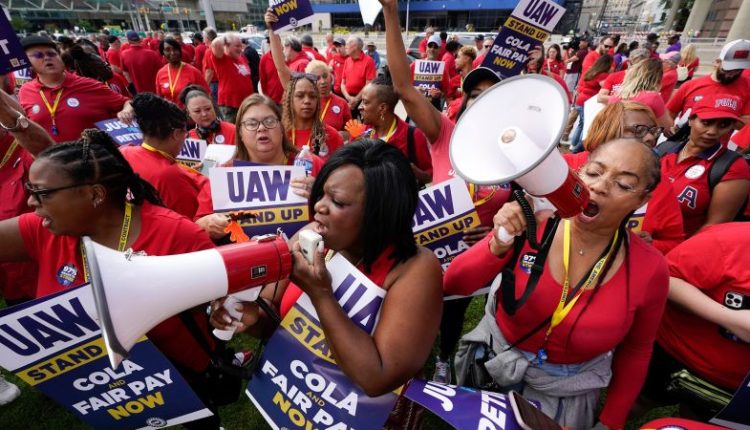From actors to autoworkers, more than 450,000 workers have participated in 312 strikes in the United States this year, according to Cornell University’s Labor Action Tracker.
Are all of these workers missing from the US government’s monthly jobs reports?
The report produced by the Bureau of Labor Statistics is a product of two different surveys.
One asks a sample group of employers to report how many workers they employed, based on their payroll records for the pay period that includes the 12th of the month. Data from that survey is used to determine how many people were hired or laid off in a given month.
“If the striking workers earned pay for any part of the reference period, even one hour, they are counted as employed,” Cody Parkinson, an economist at the BLS, told CNN. “Striking workers are reflected as a subtraction from the employment level in the first monthly estimate when they are not working in the reference pay period. They are added back only when they return to work.”
That means that in the September jobs report, United Auto Workers members on strike are counted as employed since the strike began on September 15, which was during the reference week. But if the strike continues through the end of next week they will not be counted as employed in the October jobs report due next month unless they are on the payroll of a different employer.
In contrast, the impact of the SAG-AFTRA strike, which began in July, showed up in some of the data that was included in the September jobs report.
“Employment in motion picture and sound recording industries continued to trend down (-7,000) and has declined by 45,000 since May, reflecting the impact of labor disputes,” the BLS noted in the September jobs report.
In the case of the Writers Guild of America strike, which recently ended, many of the union members were contract workers or freelancers. So you wouldn’t be able to see the impact of strikes simply by looking at industry hiring data that comes from payroll data.
However, there’s another survey used to construct the monthly jobs report that asks individuals if they worked in a given week. Data from that survey is used to calculate the unemployment rate. Since the survey captures almost all types of working arrangements, contractors and freelancers on strike would impact the data.
The BLS classifies someone as unemployed “if they were not working but were available to work and actively looked for work in the prior 4 weeks.”
If the answer to that is no, they aren’t considered part of the labor force even if they are part of a striking union.
If someone was on strike but earned money working a different way, like driving for Uber, during the reference period, they’d be counted as employed.
Finally, “a worker who was on strike for the entire reference period and did not have a job would be counted as employed but not at work due to a labor dispute,” Parkinson said.
Read the full article here

